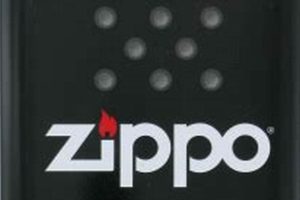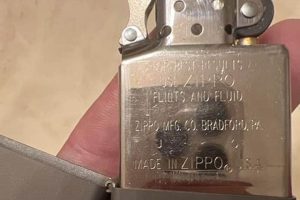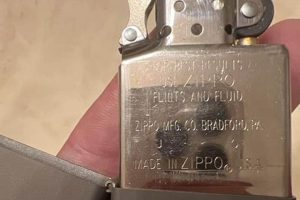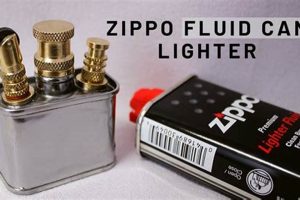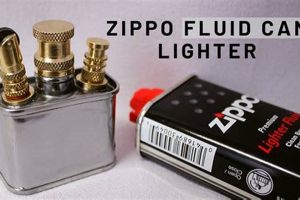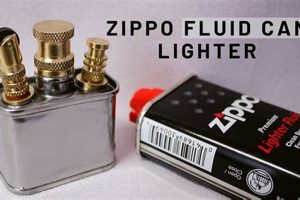Using charcoal lighter fluid in a Zippo-style lighter is strongly discouraged. These lighters are designed for a specific type of refined petroleum distillate, typically lighter fluid formulated for wick-based lighters. Charcoal lighter fluid generally has a different chemical composition, often containing heavier hydrocarbons and additives that can leave residue, clog the wick, produce excessive soot, and potentially damage the lighter’s internal mechanisms. Attempting to use an unsuitable fuel can also lead to unpredictable flame height and increased risk of flare-ups.
Maintaining a Zippo lighter with the correct fuel is essential for optimal performance and longevity. The recommended lighter fluids are formulated to burn cleanly and consistently, preventing buildup that could interfere with the lighter’s function. This practice ensures a reliable flame while minimizing the risk of damage and maintaining the intended lifespan of the lighter. Historically, these lighters have become renowned for their durability and dependability, attributes largely linked to the use of appropriate fuel.
Further exploration of lighter maintenance and fuel types will provide a deeper understanding of fuel compatibility and its impact on lighter performance. Topics to consider include the different types of lighter fluid available, the specific needs of various lighter designs, and best practices for cleaning and maintaining lighters for optimal and safe functionality.
Tips for Proper Lighter Fuel Usage
Maintaining a lighter’s functionality and longevity depends significantly on using the correct fuel. These tips emphasize safe and effective lighter maintenance practices centered around appropriate fuel selection.
Tip 1: Consult the Manufacturer’s Recommendations: Always refer to the manufacturer’s instructions for the specific type of fuel recommended for a given lighter. This information is crucial for ensuring optimal performance and preventing damage.
Tip 2: Use Lighter-Specific Fuel: Utilize lighter fluid explicitly designed for wick-based lighters. These fluids are formulated to burn cleanly and consistently, unlike other flammable liquids.
Tip 3: Avoid Charcoal Lighter Fluid: Never use charcoal lighter fluid in a lighter designed for lighter fluid. The chemical composition differences can lead to clogging, sooting, and potential damage.
Tip 4: Store Fuel Safely: Keep lighter fluid in a cool, dry place away from open flames and out of reach of children. Proper storage prevents accidents and maintains fuel quality.
Tip 5: Refuel Carefully: Extinguish the lighter completely before refueling. Avoid overfilling and wipe away any spilled fuel immediately to prevent accidental ignition.
Tip 6: Regular Maintenance: Periodically clean the lighter and replace the wick according to the manufacturer’s instructions. This practice ensures consistent performance and prolongs the lighter’s lifespan.
Tip 7: Recognize Signs of Incorrect Fuel Use: Excessive soot, inconsistent flame height, difficulty igniting, and a strong chemical odor are indicators that the wrong fuel may be in use. If these signs occur, discontinue use, clean the lighter, and refill with the correct fuel.
Adhering to these guidelines ensures safe and efficient lighter operation, extending its functional life and minimizing potential hazards. Proper fuel selection and maintenance are essential for reliable and long-lasting performance.
By understanding the importance of correct fuel usage and implementing these practical tips, users can maintain the optimal performance and lifespan of their lighters. This knowledge contributes to a safer and more enjoyable experience.
1. Fuel Compatibility
Fuel compatibility is critical for the safe and effective operation of any combustion engine, including the simple but elegant mechanism of a Zippo lighter. Understanding this principle is essential when considering the use of Expert Grill lighter fluid in a Zippo, as fuel type directly impacts functionality and longevity.
- Chemical Composition
Different fuels possess varying chemical compositions, affecting their burning characteristics. Zippo lighter fluid is a refined petroleum distillate designed for a clean, controlled burn. Expert Grill lighter fluid, intended for charcoal, typically contains heavier hydrocarbons and additives that can leave residue, clog the wick, and produce excessive soot within the finer mechanics of a Zippo.
- Viscosity
Viscosity, the thickness of a fluid, affects its flow rate. Zippo lighter fluid is formulated for optimal wick saturation and consistent flame height. The higher viscosity of grill lighter fluid can impede proper wick absorption, leading to uneven burning, difficulty igniting, and potential overflow during refueling.
- Volatility
Volatility, the rate at which a liquid evaporates, influences ignition and flame stability. Zippo lighter fluid is designed for easy ignition and a steady flame. Grill lighter fluid, formulated for igniting charcoal, might have different volatility characteristics, potentially causing unpredictable flame behavior in a Zippo.
- Residue and Clogging
The chemical additives and heavier hydrocarbons in grill lighter fluid can leave behind significant residue after combustion. This residue can clog the small wick passages in a Zippo, hindering fuel flow and ultimately rendering the lighter unusable. The refined nature of Zippo lighter fluid minimizes residue, promoting long-term functionality.
Attempting to use Expert Grill lighter fluid in a Zippo lighter ultimately jeopardizes the lighter’s performance and lifespan due to fundamental incompatibilities in chemical composition, viscosity, volatility, and residue production. Using the correct fuel is crucial for maintaining a Zippo’s intended functionality and ensuring its longevity.
2. Lighter Damage
Using grill lighter fluid in a Zippo-style lighter presents a substantial risk of damage. These lighters are engineered for a specific type of fuel, and using an incompatible fluid like grill starter can have detrimental effects on various components.
The heavier hydrocarbons and additives often present in grill lighter fluid can leave a thick, gummy residue within the lighter’s casing. This residue can clog the wick, restricting fuel flow and hindering ignition. Over time, the accumulated residue can also interfere with the flint wheel mechanism, impacting spark production and leading to unreliable ignition. Furthermore, the inappropriate fuel can corrode the internal metal components, compromising the structural integrity of the lighter and potentially leading to leaks.
For example, a user attempting to use grill lighter fluid in a Zippo might initially experience difficulty lighting the lighter. Continued use can lead to a persistent, foul-smelling smoke, a sputtering flame, and eventual failure of the lighter to ignite altogether. Disassembling the lighter would likely reveal a wick heavily coated in residue, a sluggish flint wheel mechanism, and potentially even corrosion on the metal components. Repairing this damage can be costly or even impossible, requiring replacement of affected parts or the entire lighter.
Understanding the potential for lighter damage resulting from incompatible fuel underscores the importance of using only the recommended lighter fluid. This proactive measure preserves the lighter’s functionality, ensures consistent performance, and avoids the inconvenience and expense of repairs or replacement. Choosing the appropriate fuel is a simple yet crucial step in maintaining the longevity and reliability of a Zippo lighter.
3. Residue Buildup
Residue buildup is a significant consequence of using grill lighter fluid in a Zippo-style lighter. These lighters are designed for refined, lighter fluids with a specific chemical composition. Grill lighter fluids often contain heavier hydrocarbons, additives, and other components not present in standard lighter fluid. When burned in a Zippo, these substances do not combust completely, leaving behind a sticky, tar-like residue.
This residue accumulates on the wick, inside the chimney, and on other internal components. The buildup restricts the wick’s ability to absorb lighter fluid, leading to a diminished fuel supply to the flame. The restricted fuel flow results in a weaker, inconsistent flame or even prevents the lighter from igniting altogether. Furthermore, the residue can obstruct the flint wheel mechanism, making sparking more difficult. In extreme cases, the buildup can completely block the fuel flow, rendering the lighter unusable.
For example, repeated use of grill lighter fluid in a Zippo can lead to a noticeable decrease in flame height and stability. Upon inspection, one would find a blackened, sticky residue coating the wick and the interior of the lighter casing. Attempting to clean this residue can be challenging, and it often necessitates replacing the wick and thoroughly cleaning the lighter’s internal components. This illustrates the direct link between using an unsuitable fuel and the detrimental residue buildup that compromises the lighter’s performance and lifespan.
Understanding the connection between residue buildup and improper fuel use is crucial for maintaining the longevity and functionality of a Zippo lighter. Using the correct fuel prevents this buildup, ensuring consistent performance and extending the lighter’s lifespan. Addressing the issue of residue buildup highlights the practical importance of using the appropriate fuel and reinforces the potential consequences of using inappropriate alternatives like grill lighter fluid.
4. Clogged Wicks
Clogged wicks represent a frequent and significant consequence of using inappropriate fuels, such as expert grill lighter fluid, in Zippo-style lighters. These lighters are engineered for a specific type of refined fuel, and deviations from this recommendation can lead to wick clogging and diminished performance. Exploring the relationship between clogged wicks and the use of incorrect fuels provides valuable insights into maintaining lighter functionality and longevity.
- Residue Accumulation
Grill lighter fluid contains heavier hydrocarbons and additives not found in standard lighter fluid. These substances do not combust completely, leaving behind a sticky residue that accumulates on the wick. This residue progressively restricts the capillary action of the wick, hindering its ability to draw fuel upwards.
- Reduced Fuel Flow
As residue builds up on the wick, the flow of fuel to the flame is significantly reduced. This results in a weaker, less consistent flame, often characterized by sputtering and flickering. In some cases, the fuel flow can be completely obstructed, preventing the lighter from igniting altogether.
- Impaired Lighter Function
A clogged wick directly impairs the functionality of the lighter. The restricted fuel flow not only affects the flame’s consistency but also makes ignition more difficult. Repeated attempts to light a lighter with a clogged wick can further exacerbate the problem, pushing the residue deeper into the wick fibers.
- Cleaning and Replacement
Cleaning a clogged wick can be challenging and time-consuming. While some success might be achieved through careful cleaning, severe clogging often necessitates wick replacement. This adds to the maintenance requirements and underscores the preventative value of using the correct fuel from the outset.
The connection between clogged wicks and the use of grill lighter fluid in a Zippo lighter highlights the critical importance of fuel selection. Opting for the correct fuel avoids residue buildup, maintains optimal wick functionality, and ensures consistent performance. Understanding this relationship allows users to make informed decisions about fuel choices, ultimately preserving the longevity and reliability of their lighters.
5. Inconsistent Flames
Inconsistent flames are a direct consequence of using improper fuels, such as expert grill lighter fluid, in Zippo-style lighters. These lighters are meticulously engineered for a specific type of refined fuel, and deviations from this recommendation often manifest as unstable and unpredictable flame behavior. Examining the causal relationship between incorrect fuel usage and inconsistent flames offers critical insights for maintaining lighter performance and safety.
The heavier hydrocarbons and additives present in grill lighter fluid disrupt the precisely balanced combustion process within a Zippo lighter. These substances do not vaporize and burn as cleanly as the intended lighter fluid, leading to uneven fuel delivery to the flame. This uneven delivery manifests as flickering, sputtering, and variations in flame height, creating an unreliable and potentially hazardous flame. Furthermore, the incomplete combustion of these heavier hydrocarbons produces excessive soot and residue, further obstructing fuel flow and exacerbating flame instability.
Consider a scenario where grill lighter fluid is used in a Zippo. Upon ignition, the flame might initially appear larger than normal, followed by periods of sputtering and shrinking. The flame height may fluctuate unpredictably, making it difficult to use the lighter reliably for its intended purpose. This erratic behavior not only compromises functionality but also increases the risk of accidental burns or ignition of nearby materials. Such inconsistencies underscore the inherent dangers of using inappropriate fuels.
Understanding the direct link between inconsistent flames and the use of incorrect fuels, such as expert grill lighter fluid, is crucial for ensuring safe and reliable lighter operation. Using the correct fuel promotes a consistent, controlled flame, maximizing functionality and minimizing potential hazards. This knowledge empowers users to make informed fuel choices and maintain the optimal performance and safety of their Zippo lighters.
6. Safety Hazards
Utilizing grill lighter fluid in a Zippo-style lighter presents significant safety hazards. These hazards stem from the incompatibility of grill lighter fluid with the lighter’s design and intended fuel. The consequences can range from minor inconveniences to serious accidents.
Grill lighter fluid typically contains heavier hydrocarbons and volatile additives not present in standard lighter fluid. These components can cause unpredictable flame behavior, such as high, erratic flames and flare-ups. The increased flame height raises the risk of burns and accidental ignition of nearby materials. Furthermore, the volatile nature of some grill lighter fluids increases the risk of explosions, especially during refueling. A specific example would be attempting to refill a still-warm Zippo with grill lighter fluid. The residual heat can ignite the highly volatile vapors, causing a flash fire or explosion. Additionally, the incomplete combustion of these heavier hydrocarbons produces more soot and carbon monoxide than standard lighter fluid, posing a potential respiratory hazard in poorly ventilated areas.
The use of an incorrect fuel also contributes to malfunction and damage within the lighter itself. Residue buildup from grill lighter fluid can clog fuel lines and the wick, leading to malfunctions that increase the risk of uncontrolled fuel release and ignition. This malfunction can manifest as leaks, sputtering flames, or difficulty extinguishing the lighter, all of which heighten the risk of fire. Therefore, understanding the potential safety hazards associated with using grill lighter fluid in a Zippo lighter is crucial. Choosing the correct fuel significantly mitigates these risks, ensuring safer and more reliable operation. Adhering to manufacturer recommendations regarding fuel type is paramount for minimizing potential hazards and promoting responsible lighter usage.
Frequently Asked Questions
This section addresses common inquiries regarding the use of lighter fluids, specifically focusing on the critical distinction between fuels designed for grills and those intended for Zippo-style lighters.
Question 1: What is the primary reason against using grill lighter fluid in a Zippo lighter?
Grill lighter fluid contains heavier hydrocarbons and additives that leave residue, clog wicks, and damage Zippo lighter mechanisms. These lighters are designed for a specific type of refined fuel to ensure optimal performance and longevity.
Question 2: What are the potential consequences of using the wrong fuel in a Zippo?
Consequences can include a clogged wick, inconsistent flame, reduced lighter lifespan, difficulty igniting, excessive soot production, and potential damage to internal components. In some cases, improper fuel can create a safety hazard.
Question 3: Why does Zippo recommend a specific type of lighter fluid?
Zippo recommends its own brand of lighter fluid because it’s specifically formulated for optimal performance in their lighters. This fluid ensures a clean burn, consistent flame, and minimizes residue buildup, contributing to the lighter’s longevity.
Question 4: Are all lighter fluids the same?
No, lighter fluids are not universally interchangeable. Different lighter types require specific fuel formulations. Using the incorrect type can lead to malfunctions, damage, and potential safety hazards. Always consult the manufacturer’s recommendations.
Question 5: How can one tell if the wrong fuel is being used in a Zippo?
Indicators of incorrect fuel use include excessive soot buildup, an inconsistent or weak flame, difficulty igniting, unusual odors during burning, and a sticky residue inside the lighter casing.
Question 6: What should be done if the wrong fuel has been used in a Zippo?
If the wrong fuel has been used, immediately discontinue use. Empty the lighter, clean the interior with a cotton swab and appropriate cleaning solution, and replace the wick if necessary. Refill with the correct Zippo premium lighter fluid.
Adhering to manufacturer recommendations regarding fuel type is paramount for maintaining lighter performance and safety. Choosing the appropriate fuel ensures consistent, reliable operation while minimizing risks.
Further information on lighter maintenance and fuel types can be found in the following resources…
Conclusion
Exploration of the question regarding the use of expert grill lighter fluid in a Zippo lighter reveals significant incompatibility. Using grill lighter fluid in a Zippo is strongly discouraged due to the potential for damage and safety hazards. The chemical composition of grill lighter fluid differs substantially from that of Zippo premium lighter fluid. This difference leads to residue buildup, clogged wicks, inconsistent flames, and potential damage to internal components. Furthermore, using an inappropriate fuel can create safety risks, including unpredictable flame behavior and increased risk of fire.
Maintaining a Zippo lighter’s optimal performance and longevity requires using the correct fuel. Adhering to manufacturer recommendations ensures reliable operation and minimizes potential hazards. Prioritizing proper fuel selection contributes to a safer and more satisfying lighter experience, preserving the lighter’s intended functionality for years to come. Investing in the correct fuel is a small price to pay for ensuring the longevity and dependable performance of a precision instrument.


